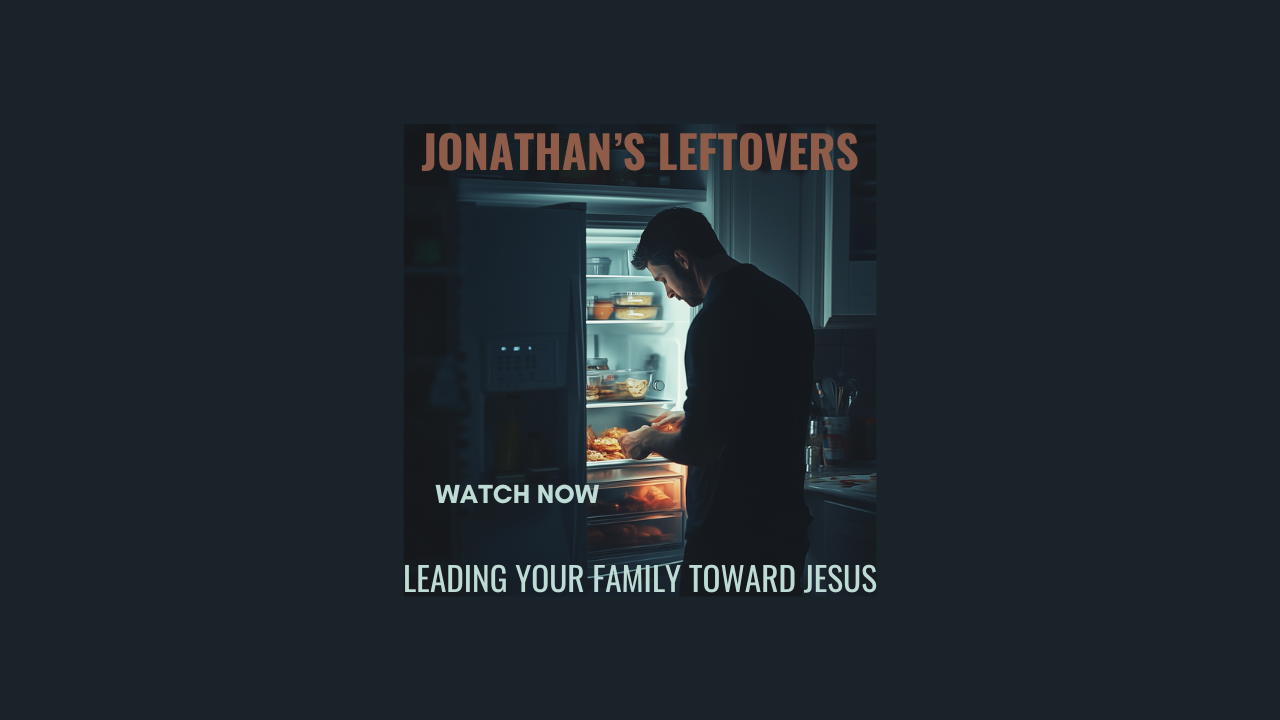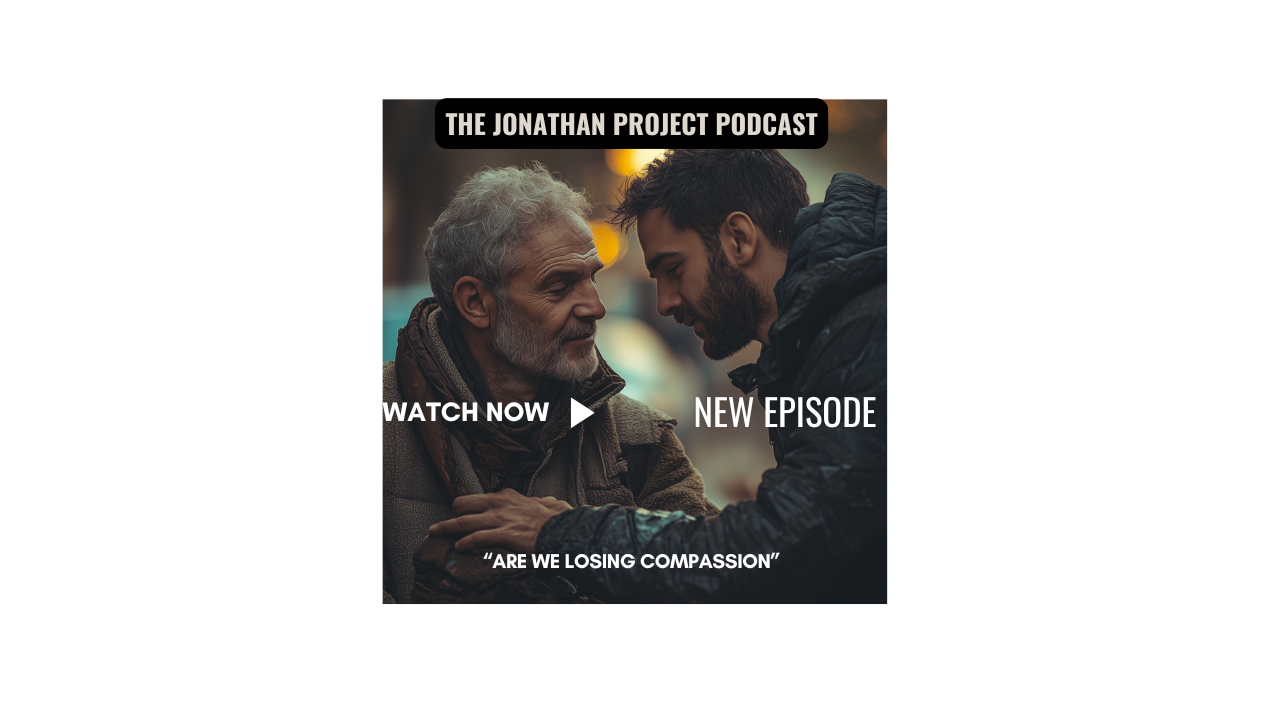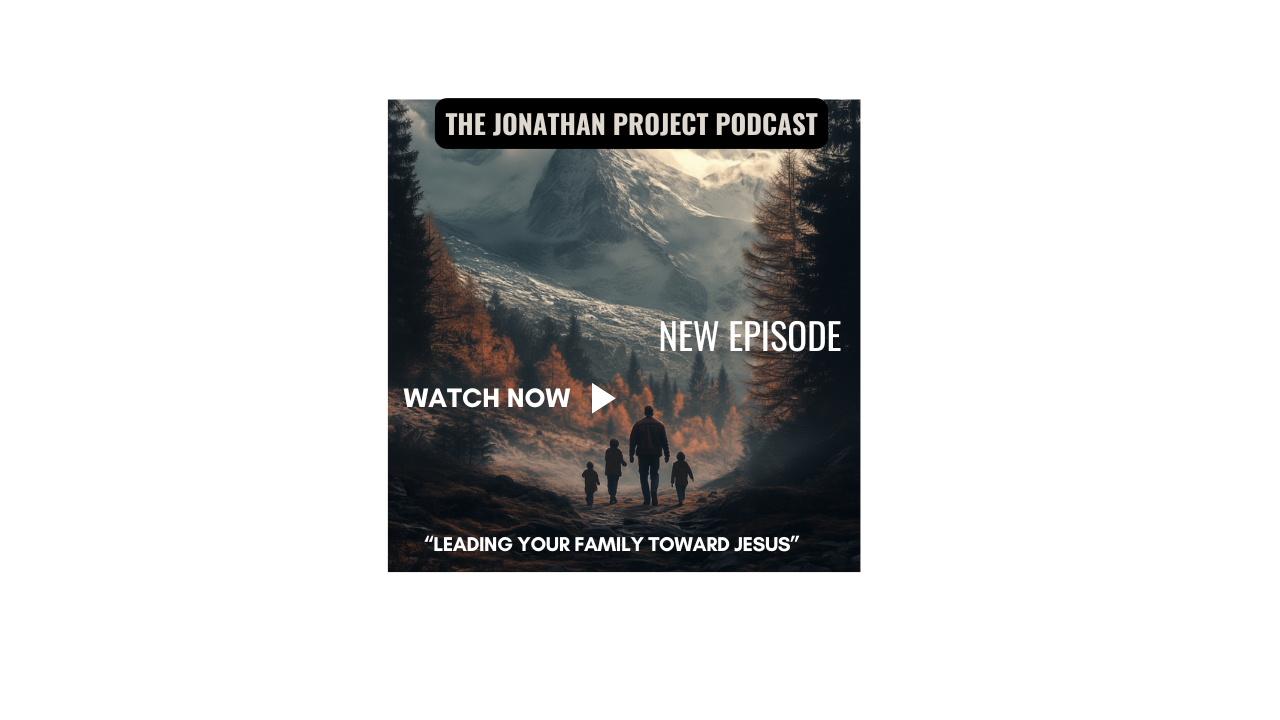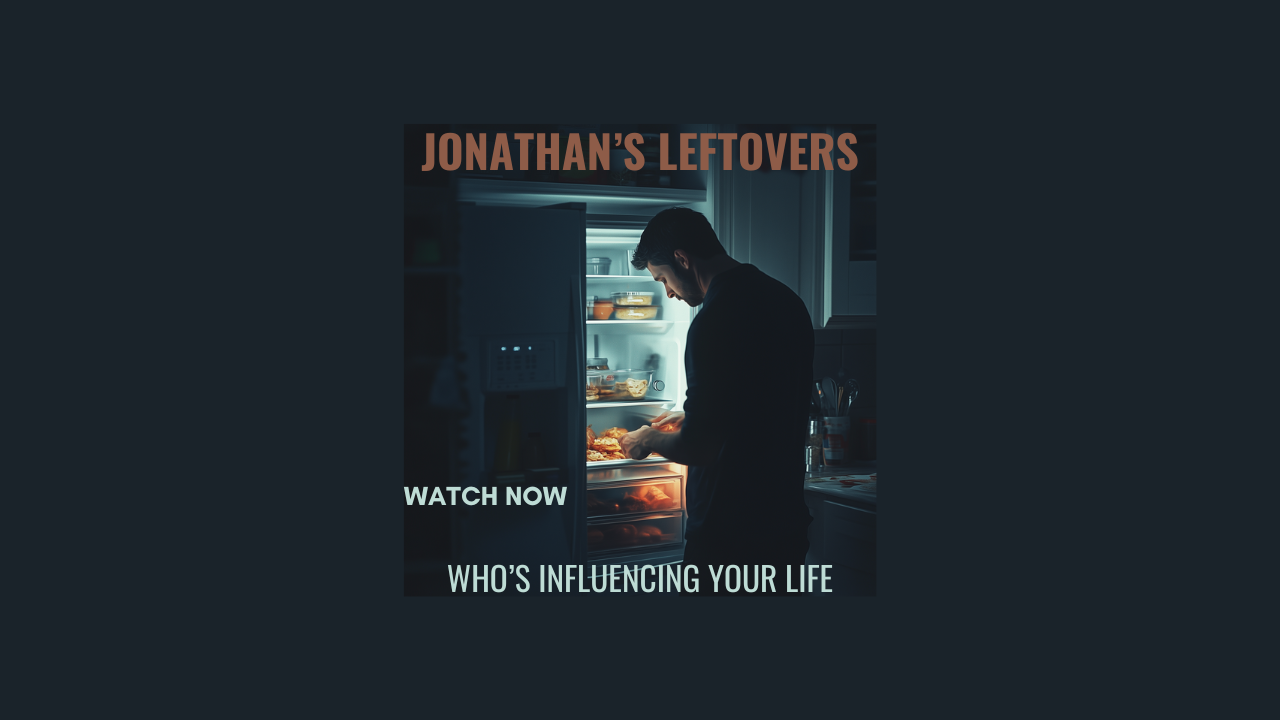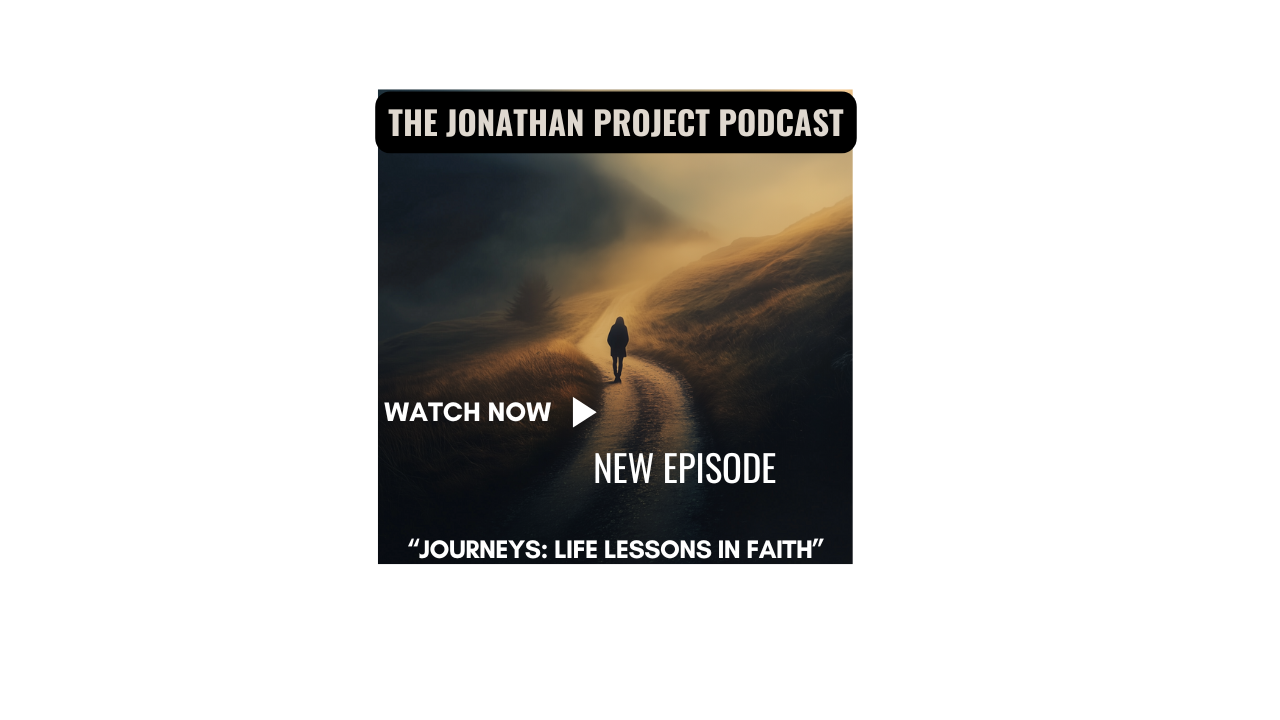Episode Transcript
[00:00:00] Speaker A: Foreign.
Hey, welcome everyone to another episode of the Jonathan Project podcast where iron is sharpening iron. And we take the inspiration for this show from Jonathan and his good friend David and future king. If you want Jason and me to come out, speak to a men's event. If you have something going on at a local business and you found inspiration from this show, please reach out to us at the Jonathan Project podcast gmail.com. again, the Jonathan Project podcast gmail.com. jason, welcome to the show and a very unique recording. As we're recording, the audience doesn't know, we know in the middle of the week because there's a lot going on.
[00:00:53] Speaker B: There's a lot going on this weekend, you know, or week as you're getting ready to head out.
[00:00:58] Speaker A: Yes, sir.
[00:00:59] Speaker B: Down as well.
No. And just as the audience doesn't know, we actually didn't have as much technical Animal Planet this time. We had life just occur as, you know, bike traffic, coming home.
[00:01:14] Speaker A: Yeah.
[00:01:15] Speaker B: Just a thousand things that are going on.
[00:01:17] Speaker A: So, yeah, spouses out of town and all kinds of stuff is happening in, in our lives. So.
[00:01:23] Speaker B: But to be, you know, to live up to what we talk about sometimes the magical superpower is just showing up.
[00:01:31] Speaker A: It is, it is. And you know, it, it's, it's tough. And again, we try to be both flexible for each other and, and, and then trying to deliver for folks that have come to enjoy listening to this each and every week, you know, but it's a fine balance, right, because we are tent makers like Paul.
A full time job, it doesn't even, there's no coin in the pocket for this. So it is straight for the kingdom. And our return on investment might not be on this side of eternity, but it most definitely will be in the kingdom. So it's all good. I'm glad we're here.
And so we have a really impactful thing. This is the season finale, believe it or not, for season four. This is episode 10. And you know, you want to talk about what we're going to jump into here.
[00:02:17] Speaker B: I didn't realize it was episode 10.
[00:02:19] Speaker A: I know, it is.
[00:02:22] Speaker B: So, okay, season finale, what we're going to talk about is kindness and are we losing our compassion for other people?
You know, and I saw this psychology article. It said, believe it or not, we're, we're not. They said, oh, we're making this rebound on being compassionate. I'm like, okay, well, that's a symptom. Are we actually losing our kindness though, toward people? Are we becoming less polite? Is a good measurement. And Overwhelmingly, everybody says that we are right. And what this made me stop think about was the other day, our number one fan, my wife was taking some stuff to the post office and she was returning and she says there she was going in and two full grown men watched her carry boxes and then struggle with the door.
[00:03:16] Speaker A: Yeah.
[00:03:17] Speaker B: And you know, which is something that I teach my son. I'm like, hey, help people when you can. Because, you know, the Bible says when you can, do good, do good.
[00:03:27] Speaker A: Yes.
[00:03:28] Speaker B: That simple.
[00:03:29] Speaker A: Yeah.
[00:03:30] Speaker B: And so it made me wonder, are we losing our politeness? You know, we, we may, we're compassionate for everybody, but as long as that compassion doesn't cause an action on us. Yeah, right.
[00:03:42] Speaker A: Yeah.
[00:03:43] Speaker B: Makes sense.
[00:03:44] Speaker A: No, it does. You know, and I think about, you know, as I was trying to get ready for this episode in the midst of, you know, a busy week, you know, it's like I think we need to have empathy as the word I would use, you know, kindness, empathy in a time where most don't. And I, I'll share this story, but I'll share with the audience. Last, you know, summer, a couple months ago, actually, I was having to travel quite a bit to Houston for work. And I was sitting in the airport getting ready for a return trip back here to Florida. And there was, you know, a middle aged lady with a mask on, which there was a couple sitting kind of next to me. And they were, they took really great offense to her having this mask on. You know, they were talking a little bit louder than maybe they wanted and they were, you know, disparaging her, aligning her with a political ideology and party that they obviously didn't subscribe to.
And what they didn't notice was that on the side of the mask it said MD Anderson. Which for anybody that knows, MD Anderson is a really big cancer center in Houston that, you know, does a lot of research and, you know, is probably one of the best cancer centers in the country. And obviously this lady was there for treatment and her immune system, as anyone that knows that people that have those is compromised. Right. So it's a life or death thing, a cold when you have such a serious disease. And so what did you do? What I said was, because I could hear it and I said, john, I was like, I think, you know, she has a MD Anderson mask on. And I just said it like that. Didn't make a scene, didn't try to embarrass them. I just tried to let them know, hey, I can hear you, but I think you miss him. And they kind of looked at me and they looked at each other and they got quiet. But the whole point of that is, you know, empathy is not weakness. It's Christlike strength. And the world is growing colder. But as Christian men, we have to be different. And, you know, Jesus was the ultimate example of empathy, and we're called to follow his example.
[00:05:46] Speaker B: You got a good point. There's times when you don't have any empathy in life, right? And there's times when you got to have a lot. Like I tell my son as a man, some days you're going to go to work and it's going to be cold, wet and raining, and you don't. Motivation. Everybody has these motivational memes that seem to be pretty popular.
Okay. And I'm probably going to get in trouble, but I've said this, and Pat, Pat is out there listening right now. I know motivation is what fifth graders need to run around the gym floor. As a full grown man, all my motivation is sleeping in the house when I'm going out to work. Right? That's it. So sometimes I have no empathy when people go, ah, it's cold. I don't want to go outside and go to work for my family. Nope, you gotta go because it is cold. Right?
[00:06:34] Speaker A: Yeah, absolutely, man. But I think we're gonna. I'm most definitely. I found something similar, you know, that they're gonna talk about. Like there is. There's empathy and then there's being an enabler to sin. And you have to. Again, I'll use the example of the woman that is going through cancer treatment is. Is a moment where you need to have empathy. You need to show some grace. Right? Because. Right. Who else is listening to that conversation? And if they, if you turn around and you're disparaging this lady for something that, you know, whatever you want to believe, and then you come right back and you have another conversation about Christ. You just created a barrier. And that's the point of saying that you need to understand how and when to apply that. Right. Just because you have empathy doesn't mean that you condone sin. And the Bible says if a man doesn't work, he shouldn't eat. So to Jason's kind of point, but there is an understanding, a nuance and a balance to the world around us.
[00:07:36] Speaker B: No empathy. And they talk a lot about the divide. Right? Right now there's massive divide and the political divide. It's one of the fissure points. Right. And I think about Jesus when in, in the Book of Matthew. And I think it's Very interesting that it is Matthew that records this because he was a tax collector. That's probably why it hit it, right? And they go, okay, Jesus, do we pay taxes now? Taxes is a pretty contentious topic, right?
[00:08:09] Speaker A: Yeah.
[00:08:10] Speaker B: And that was a big deal back then. Romans were like, ah, you know, you're going to pay us. We. We are the. We are the government. You're going to pay us, by the way, pretty oppressive.
[00:08:19] Speaker A: Yeah.
[00:08:20] Speaker B: And they asked Jesus about it, and he goes, you know, I need to borrow a coin. As a matter of fact. So for everybody out there, that is the name it. Claim it, Jesus. I had to borrow a coin. Think about it. So he goes, and so he gets it and he goes, ah, whose pictures on this thing? And he goes, well, it's Caesar. Well, you're going to give unto Caesar, but you're going to give unto God. What's God? And you're made in God's image so that. That you should absolutely have compassion and love. That's the fruit of the spirit, right?
[00:08:52] Speaker A: Well, yeah, Jason, and even bigger than that, you know, you get the great. One of the second great commandment is to love your neighbor as yourself. Matthew 22 and 39. And again, loving your neighbor as yourself. Right. So imagine if you are going through something and you are getting judged and misaligned, or someone in your family is. That's your child, that's your daughter. Right. How would you feel if you see a friend, for example, and this is the nuance, and they tell you, hey, I'm not happy in my relationship and I'm going to go out and do something wrong. Empathy is not saying, oh, man, you, you know what, you're not feeling good, you're not happy. No, there's. There's the time where, as Jason said, like, I'm not gonna empathize with you. I'm gonna speak truth.
[00:09:40] Speaker B: Yeah.
[00:09:41] Speaker A: Right. And I'm gonna do it with grace. Like, hey, man, that's not a good road to go down. Right. And find a way to do that. But we need to understand that difference and look at Jesus as an example. You know, Jesus wept, had empathy for Martha and Mary. Now, again, he didn't rush to raise Lazarus when they wanted to and do it exactly the way they thought it should be done. But he did recognize those feelings in that pain, you know, and there's many examples of Jesus having that as an example. Right.
[00:10:13] Speaker B: He had compassion on the people that followed. Yeah. He fed the 5,000.
[00:10:19] Speaker A: And that was because of compassion. Yeah, right.
[00:10:21] Speaker B: He had compassion on him. And, you know, he feeds the 5,000 which were all Israelites. And then let's look at it over here. And later on he feeds the 4,000, right. With the seven loaves and seven baskets. And he feeds them and he has compassion on them. And by the way, they're all gentiles now in America and everything, we, we try to treat everybody equally. Right. But in that time and in other places, the world, there's straight up social divide.
[00:10:52] Speaker A: Yeah.
[00:10:53] Speaker B: And that was it. He look at the lady at the well, the Samaritan at the well. When you talk about Jesus going outside and going, hey, I've got compassion on people.
[00:11:04] Speaker A: Yeah.
[00:11:06] Speaker B: I think we as men have to take that step and we as fathers hug.
You have to be. You have to be what? Christ. You have to be Christ. Like, right. The world may tell you there's no sympathy for anybody, no empathy, but the truth is Jesus did. Jesus had. He cared about people.
[00:11:28] Speaker A: Yeah, absolutely. You know, and that's the good point that you brought. You know, the examples that you talked about, it's one of the criticisms that's thrown against Christianity is like, oh, you guys are just sit there and pray and you won't do anything. Well, Jesus says that you should chose to be the hands and feet. And empathy is not just a feeling, but it's act. James 2, 15, 16. If a brother or sister is poorly clothed and lacked in daily food, and one of you says, go in peace, be warm and filled without giving them things needed for the body, what good is that? First John 3, 17. If anyone has world's goods and sees his brother in need, yet closes his heart against him, how does God's love abide in it? So this whole notion of I'm just gonna pray for you, and that's how I take care of those people that I really don't like. They really don't look like me, do like me, talk like me. They're not in my tribe. It's not what Jesus is saying, it's not what Jesus did. And again, you have to understand how important having that heart for the world around you reflects that light and understanding that that is the second great commandment. There's a reason why he said that you have to love others as yourself because it moves us towards emulating and showing the world that we are different and that he who is in us is different and can transform their lives. That is the power of having empathy and care for others around you.
[00:12:55] Speaker B: Yeah, no, I love that. Love others. As you know, it's interesting when Jesus, they asked him what the two greatest commandments were he didn't balk, he didn't hesitate. He's like, love God with all your heart. Love your neighbor as yourself. It all hinges on those two.
And, you know, when I think about it, you know, Colby, interesting. When I went to, when I did all my medical training and, you know, you, you go through, you'd have to check airway and breathing and everything else, and you, you know, go through the intubation phases and all so forth, but if you messed it up, or what they would tell you is, and they would just start a clock like, you messed it up. They're like, hey, okay, well, you messed this up. So your patient there would have been not breathing for this long. Can you hold your breath that long? And you know, as a young, as a young super in shape guy, you can only hold your breath so long. And so what I began to do to help me empathize with, you know, when I was going through this, and it was a good lesson learned later in life when I had to go to places, was to hold my breath. When I was working, like, you know, in Afghanistan or wherever I work on people, I would be like, hey, I need to hold my breath. Okay, well, he's got that about that much oxygen.
Help me relate, right? Yeah, you do. Think about it. We love ourselves. We do.
[00:14:24] Speaker A: Oh, yeah.
[00:14:29] Speaker B: And, you know, we also, I, I think we do. I think we as a nation, we as a people, we grow to think of ourselves.
That's not what Jesus said.
[00:14:43] Speaker A: No, no. And you know, you bring up a good point as far as why we have to be different. You know, Christian men should resist this culture of indifference that's growing and increasing, it seems like every day, and lead with Christ, like love. You know, one of the things that you talked about is those relationships, right? Understanding with what someone else is going through doesn't mean that you have to, you know, bend over backwards and agree with every lifestyle. That's not what we're talking about here. But it helps strengthen those bonds between believers and non believer leaders. You know, being able to meet someone where they're at and not judge them, to say there is a better way and finding a way to connect with them, to get them there. He breaks down racial, social, economic barriers, those social differences by saying, you know what? I see you as a person, I see you as God sees you. You might not be there right now, but you know what, if you're willing to listen, if you're willing to build a relationship and work that way, and I can Kind of understand where you're at. I can try to help you get to a better place. It helps men having empathy lead their families, churches and your communities. You cannot lead someone if you can't empathize with them, does it? And that's one of the crystal clear things that you see between good leaders, whether you're in the military business or wherever. If you can't empathize and understand where a person's lacking maybe and they need a little help, you'll never win. Right?
[00:16:05] Speaker B: Yeah. Yeah. You've got to think about the lowest in the military. You got to think about the lowest. What's life like for him? Is he having to pay money? Is he losing money or, you know, things like that. You know, as a dad, you or as a husband, really. First Peter 3, 8 calls us out to be one, one minded, having compassion, one on another. As brethren, be pitiful and be courteous. That's not. Love your wife as a brother. It means as cross. Right, Brethren.
King James Version, what it is in the New international.
But it is right. You, you have to have compassion, you know, on your spouse and then you have it on your kids. It's, it's how it goes. I love the, the First Corinthians, chapter 13, verse 4, and use the term love a lot, but it talks about love. Love is kind.
How many you love me and then you're. You're mean to somebody, right? Or you just don't empathize, you don't have any kind of compassion.
It's not, it's hollow, right?
[00:17:11] Speaker A: Yes. It comes across as dis. Genuine. You know, and this, this concept that we're, you know, we're harping on and talking about, you know, the continued importance of, of empathy and for men to carry that forward is because it helps you address suffering.
You know, there's something that's fundamental about a lot of folks, whether you're a police officer, firefighter, doctor, medics, whatever. A lot of those folks in those professions, military, you know, especially the combat armed side of the house, is you want to alleviate suffering. You know, Isaiah 1 and 17. This could be right out of, you know, in the military, the army's kind of model or creed. Learn to do right, seek justice, defend the oppressed.
That sums up a lot of communities and different things, but it's one of those things that men put forward, good men put those kind of ideals forward. Galatians 6 and 2 says this. Carry each other's burdens, and in this way you will fulfill the law of Christ. You Know, you cannot shirk when a brother is suffering or you shouldn't, because you could be you next. And we go through experiences and we have these trials and tribulations, and some of it is not just for us, is to be able to be a step, a stone, to get that person back to where they need to be. And if you can't realize that and have that heart, then you really should question and take a pause and reflect whose spirit is really guiding you. Because Christ would always do that. He did that on the cross, point blank.
[00:18:48] Speaker B: You know, I love where you're going with this. And I do think about it as men. That feeling of compassion. Right. Towards those that are suffering or those that are hurt, that's like a barometer. Right. Like an internal barometer. That's more like a thermometer on your truck or oil pressure gauge on your truck. Right. And if it ain't working, maybe there's a problem. Right. Maybe you don't have enough oil in there, you know. Oh. Or maybe you're like me and you have an old truck that when it's cold, it just quits working. The gauge, it's working. I don't, I don't know.
You got to be careful about that. If you grow to not have compassion because you're so busy in life and you need to slow down. There's more to life than the immediate rush.
[00:19:33] Speaker A: Yes, sir.
[00:19:35] Speaker B: And I think about it because we, we become very self centered.
You see it every day in traffic. I saw a fine example of it today. We are going down the interstate and fighting the traffic and there is a car in the middle lane hitting the brakes at 45 miles an hour. And when I. We kind of get around, this is very busy time. This person, their head is so far down in that phone.
First I thought, well, man, they slumped over in the car. Right. But it's not. It's, you know, and that's. That is a very. You got to think about it. That person didn't have a lot of compassion for everybody else.
[00:20:16] Speaker A: Yeah, yeah.
[00:20:17] Speaker B: And I think as Christians, you see that. And it's not just texting and driving makes you mad or angry. It's more of this is not how life should be, but how do I feel about that person?
[00:20:31] Speaker A: Yeah.
[00:20:31] Speaker B: And those are great teaching points to your kids.
[00:20:34] Speaker A: Yeah.
[00:20:35] Speaker B: Hey, not texting, driving. This is about, hey, this is. Let's, let's have some compassion on everybody moving forward as well as your safety.
[00:20:46] Speaker A: No, you're right, Jason and I think, you know, good kind of segue to at least. And for my notes, like, this next idea is like, you know, God has already given men, everyone, the tools to develop this empathy for us around us and to fulfill that, that second commandment he gave us. But you have to be intentional. You know, are you observing? Are you paying attention to the suffering around you? Are you asking yourself, who around me is struggling? You know, how can I help carry those burdens? Are you praying? You know, are you engaging people, listening, you know, be quick to listen, slow to speak, slow to anger. James 1 and 1:19. You know, that's what we're called to do each and every day. And that's how you build that practical experience of being empathetic. You know, remembering the gospel that Jesus endured and suffered for us, Let that be foremost and present in your mind while you're, you know, maybe want to have that moment and we're all human and no one walks on water here, but having that moment to say, you know what? I don't know what's going on in that person's life that is swerving through traffic like a maniac or that guy that just slammed the door in that lady's face. I don't know what's going on in their life. But, you know, Jesus endured and suffered for him just like he did for us. And I need to have that understanding.
[00:22:00] Speaker B: No, you know, I think. I think that's when we think about compassion, we think about Jesus Christ and the fact that he died for our sins on the cross. I'm reminded this one pastor, and he said when his mother passed, his dad was there behind her. He said she was. She had riddled with cancer. Right. She had lost all of it. But behind her was a picture of what? Her wedding.
He said his dad remembered her.
Jesus remembers us and sees us at that emancipated state. Right. At that cancerous state.
Sin. Right. That's how he sees us. And he had compassion on us to save us, to go through all of that for our body.
[00:22:47] Speaker A: Yeah.
[00:22:48] Speaker B: And, you know, so when we try to envision people at their. At their best, you know, sometimes, and we're like, oh, yeah, I want to keep. This is what I remember this person as being. Well, Jesus takes us at our worst.
It's. It's in when we are in him, we become.
And that's how, as Christians, we. We should have that same grace and that same compassion towards others.
And I just fall back on, you know, when scripture says do good when you can do good. Don't. Don't withhold it. Do Good. Help somebody, hold the door. Smile for somebody, greet somebody, shake their hand. You do good when you can.
So kind of my, my closing thoughts on. On that.
[00:23:33] Speaker A: Yeah, you know, I think, you know, you have to have a sacrificial kind of mindset or develop one, because that's what Jesus had, and that's what he calls us to follow and emulate is, you know, sacrificing that time and convenience for someone else sometimes. And, and trying to put yourself in someone else's shoes can go a long way to being empathetic. You know, we got to overcome those barriers that are going to stop us. You know, pride, that's a big one, right? Romans 12:16. Never be wise in your own sight. Philippians 2, 3, 4. Count others more significant than yourselves, like humbling yourself to say, hey, man, I don't know what's going on in this guy's life. He's all fired up all the time. You know, he's coming to work, he's slamming things. You know, he's cussing up a storm. And maybe it's just he's crying out for help and just doesn't know how to right. And you don't know what's. What he's going through. Fear, that's another, you know, fear of rejection, that you're going to try to do something and someone's going to, you know, not be appreciative, whatever it may be. And then, you know, the really big one, to be quite honest, as far as why we won't be empathetic, it's just apathy, you know, point blank, you know, it teaches us as guys, as we go through life and have our own experiences, you get like this little veneer on you and, you know, you consider yourself tough, you know, and all this kind of stuff, but godly strength is compassion. And if you don't believe that, if you think Jesus was weak by any stretch of the imagination, I would take any of our tier one, most elite forces and imagine those super fit, super skilled people tearing it out the frame, as my good buddy would say, on an individual, just a group of them, and then going and enduring lashes by these same groups of individuals and then getting nailed to a cross, and you've done nothing wrong. That's what Jesus went through. And I don't know, even with some of those groups that I know that are out there, any of those men that could have taken that. So there's nothing weak about Jesus and the strength that he showed for dying for us, they don't really deserve It. If we can model even a quarter of that, you're. You're doing pretty good. So there's a reason to be empathetic.
[00:25:53] Speaker B: That's it.
[00:25:54] Speaker A: Right.
[00:25:54] Speaker B: Like the empathy, getting to know people. I love. I love how you put it. You don't know why somebody's coming in. They're angry all the time. I can give you a good guess. We can just bucket it. Something's wrong, right? Yeah, something's wrong. And, you know, I think sometimes, you know, there's not. There's very few irrational actions. There's just irrational perceptions.
[00:26:18] Speaker A: Yeah.
[00:26:19] Speaker B: And you don't know what's going on in that guy's world. And you may be the single voice to says, hey, man, I just want to talk to you. Don't care about it. And it. It may stick with that guy, but it may be someone else that's observing. Right. That's. That's the best part about a light and darkness. You know, as God called us to be the light. It permeates. Right. Like it. It shines.
It just does.
[00:26:43] Speaker A: Yeah.
[00:26:44] Speaker B: And then you've got. What else? He calls us to be the salt of the earth. Right.
[00:26:48] Speaker A: Yeah.
[00:26:49] Speaker B: Come on. Salt. You're real salt. You're not going to be broke. You can't break it down.
[00:26:53] Speaker A: Right.
[00:26:55] Speaker B: You do it with water. You do all this other stuff. The salt is salt.
[00:26:58] Speaker A: Salt, yeah.
[00:26:59] Speaker B: Yeah. Salt is salt. And that's it.
I think, as we go forward, and I didn't realize this was our season finale. Thanks.
[00:27:09] Speaker A: It's been that kind of a season. It's been a very hectic season outside of the Jonathan Project podcast for us. And, and, and again, having that empathy and understanding. Right. That life. Life goes on. Even if you're trying to do something.
[00:27:23] Speaker B: Good, you know, plenty of people out there hurt. You got a chance to see the hand on a crying shoulder. Do it.
[00:27:30] Speaker A: Yes, sir. Yes, sir. Well, folks, that's really season four. We hope that you've enjoyed all that we tried to bring to you. You know, the authenticity, the just showing up and being faithful for four seasons at 10 plus episodes of pop. What a ride this has been. And we just appreciate all the support, all the emails, which, you know, I think about Sam, like, just so kind with his gracious words, faithful listeners, guests that we had on this season. You know, Jake, you know, just grateful for. For everyone's support as we humbly try to do something to elevate men's families, communities, moms, daughters, everyone that listens to this show. Just a heartfelt thank you. Continue to pray for us that God uses this to reach the right person at the right time with this message and to let them know that no matter where you're at, no matter what you've done, Jesus Christ died for your sins. And if you truly want to get to know him, he's waiting with open arms. And so, Jason, I'll let you express any thoughts you might have on as we wrap up season for.
[00:28:43] Speaker B: No, I really do appreciate it. Thank you, Colby. If people don't realize this, Colby is the. He's the actual choreographer in this technical Animal Planet and, you know, trying to get us going. I do appreciate everything you've done. I also really do appreciate our families for the support this is. You know, I think about that. I think about the faithful listeners. I did hear from Sam, the day he's telling me he's leading about a men's bobble thing, I was like, oh, it's awesome.
[00:29:12] Speaker A: Yeah.
[00:29:13] Speaker B: And you know, Tyson let me know that as well. They're in a competition for, you know, apparently for mentioned result, you know, and I Iler and his wife use this as their Bible study as well. Yeah, several days. And I, I really can't mention everybody.
[00:29:31] Speaker A: Yeah.
Yes, yes, indeed.
[00:29:35] Speaker B: That's. That's it. Thank you very much and thank you for being patient today as I was fighting traffic.
[00:29:41] Speaker A: Nah, man. Thanks for all your flexibility and just, you know, just again, your love and support and I love doing this with you and. And next week, folks. So we will be back for season five. Somehow we will get that in there amongst all our other schedules and we'll be off and running this episode. Every episode, for those who don't know, comes out on Tuesday mornings. No matter where we're at, it will still reach you on Tuesday morning and you can it on iHeartRadio, Spotify, Apple, Amazon, you name it, you can find this podcast each and every week. If again, you found this season, all our old episodes of any use to you, and you really would like us to come speak to you in person, please reach out to us at the Jonathan Project podcast gmail.com. again, the Jonathan Project podcast gmail.com and last but not least, men, moms, women, whoever's out there listening to us, if you're looking for a devotional, guess what, we have created one and it is the best price on the planet. It is free and we will have the links in the episode segments and so please go download that, share that. And it's a 28 day devotional, about two minutes a day or so of just reflection that really edify you and build you. So please go out there, look for that resource. And we look forward to continuing. Try to find new ways to bring your stuff. Thanks again, Jason, for your time and, yeah, I'll see you in season five.
[00:31:11] Speaker B: See you in season five. See you, buddy.

